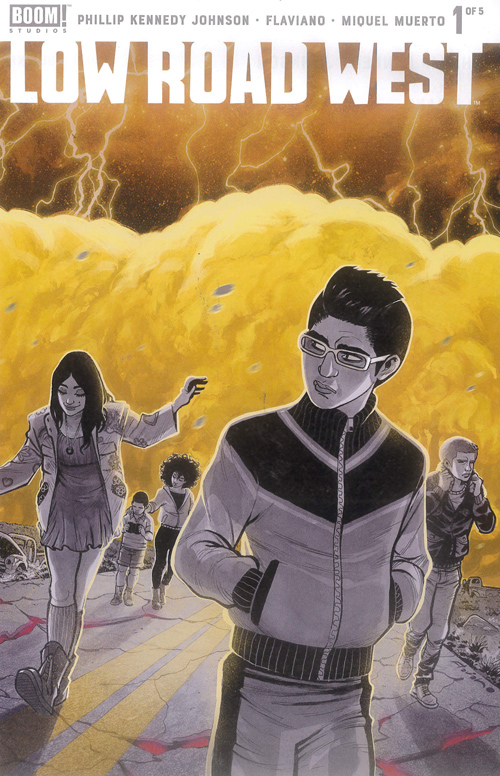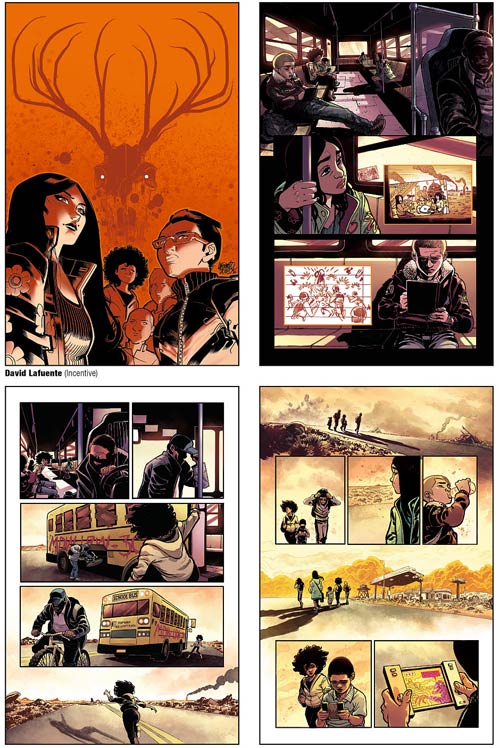Low Road West Of Nowhere
Sep 07, 2018
 |
by Vince Brusio
After the mushroom cloud, then what? Where do you go? Imagine you’re at ground zero when disaster strikes, and your first thought is to save yourself. Are you truly on your own, or do you trust someone? Is a stranger better than danger? Executive decisions made on the fly are just the first hurdle to jump in Philip Kennedy Johnson Low Road West #1 (JUL181362) from BOOM! Studios. Read our exclusive interview with Johnson who writes about teenagers that may never grow up to have kids of their own.
Low Road West #1 (JUL181362) is in comic shops September 12.
**********
Vince Brusio: You’re a fan of Stephen King’s The Stand aren’t you? The concept of a stranger having to become a wing man. It turns everything upside down. You like the idea, don’t you? Does such a plot device make for the best stories because it allows expectations to be damned?
Philip Kennedy Johnson: Low Road West bears similarities to The Stand for sure… the ragtag group of survivors trying to outrun the end of the world, or at least the end of THEIR world. Knowing the characters so well, even though they don’t know each other very well yet, is a ton of fun. When the story starts, the characters’ motivations are all completely different, and they frankly don’t like each other very much. Seeing their motivations align, seeing them realize that they need each other, and especially seeing them find things about each other that they like has been a really fun process.
Vince Brusio: What is behind the meaning of the title, Low Road West?
Philip Kennedy Johnson: In our story, “Low Road West” is the common name for the southernmost refugee corridor, a repurposed interstate highway that runs from Washington, DC to San Francisco. The first images in the book are of Low Road West, and we see how desolate the Midwest has become, and what rough shape the U.S. is in. But over the course of the series, the title takes on a double meaning. The “road west” refers to westward expansion, the way people have often looked west as they looked for the next frontier to explore. Our characters are refugees from a devastating war, and they’re desperately looking for a sanctuary. They think San Francisco is that sanctuary, but Low Road West leads them someplace very, VERY different… a new frontier, definitely.
Vince Brusio: Tell us about the people in this story. Would we know their type? Would we like them? Would we cheer if one of them stepped into a bear trap?
Philip Kennedy Johnson: Our main characters are from Washington, DC, and used to be typical American teenagers… they had school, friends, stuff they like to do, family members that annoyed them but who looked out for each other. When the East Coast was bombed and invaded, they lost all that. Their schools are bombed-out, they don’t know where their friends are, their families are dead or gone, and their “extracurriculars” pretty much amount to survival. They’re refugees, and they’re all dealing with death and loss in their own way, although none of them were prepared or equipped to do so.
Depending on how they saw themselves growing up, I think most readers will gravitate towards one or two characters more than the others. Some of the best feedback I’ve gotten from the first couple issues is that everyone who reads it has a different favorite character, and they always have different reasons. I love that readers are seeing their teenage selves in our characters, and that not everyone is rooting for the same kid.
Vince Brusio: Given the solicitation that was listed in the July PREVIEWS, we appear to have a book that lays out an archetypal journey representing the quest for identity. But in the last panel of the preview provided for the book, we're looking over someone's shoulder, and he appears to be looking at some kind of alien creature, or monster. Is this foreshadowing a threat to the nomads that are now wandering around the Oklahoma Dust Bowl?
Philip Kennedy Johnson: In that image, we’re seeing 10-year-old Ben playing a handheld video game called Doors, in which the player collects things from the environment to craft magic doors to other worlds. The game is Ben’s escape from the horrible things he’s seen and experienced, an escape he desperately needs. All the kids on that bus are dealing with death and loss in their own ways, and at the beginning of the story, that’s Ben’s. And yes, the game IS foreshadowing something. But it’s foreshadowing a MUCH bigger threat than nomads, and the Oklahoma Dust Bowl is not even close to the farthest the kids’ journey will lead.
Vince Brusio: The guts of Low Road West: is it more character driven? Plot driven? What’s the meat and potatoes?
Philip Kennedy Johnson: If all my stories had one through-line, it’s that I believe everyone is the main character of their own story, and I try to write them that way. Low Road West is all about Ben, Emma, Amir, Shawn, Angela, and [redacted spoiler]. Yes, it’s about death and loss, it’s about the refugee crisis, and like so much of my work, and it’s about America. And for people who follow the series, a TON of world-building is coming. But first and foremost, it will never stop being about these characters… the ones who survive, anyway.
 |
**********
Vince Brusio writes about comics, and writes comics. He is the long-serving Editor of PREVIEWSworld.com, the creator of PUSSYCATS, and encourages everyone to keep the faith...and keep reading comics.




